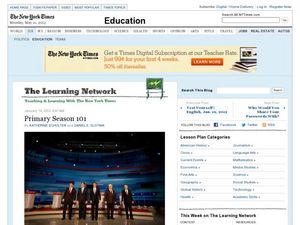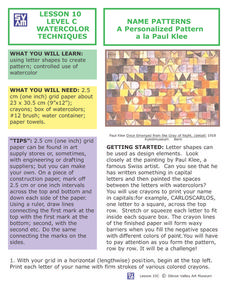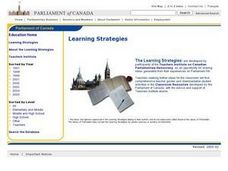Curated OER
Mannerism (1520-1600)
Young artists are immersed into the tranformative world of Manneristic Art and Architecture during the Renaissance in this vivid presentation. Providing not only clear and concise charactertistics of Mannerism but examples of many...
Curated OER
Figurative Language Quiz
Combining questions about figurative language and Sandra Cisneros's The House on Mango Street, this quiz would be a good addition to your class. The majority contains questions about simile, metaphor, and personification, from...
Curated OER
What Were the Main Achievements of the Mayan Civilization?
Guided reading questions can keep kids focused. Here they read about Mayan Civilization and then answer 9 fill-in-the-blank questions. They must use evidence from their readings to support their answers. The activity includes 3...
Curated OER
Chapter 15 Review/Acid-Base Titration and pH
Chemistry stars calculate ion concentrations, pOH, or pH in different solutions. For questions in the latter half of the instructional activity, they also have to explain why a solution is acidic, basic, or neutral and solve for molarity...
Curated OER
Chapter 12 Review, Section 3: Solutions
A neat presentation and challenging content make this solutions worksheet an ideal homework assignment for your budding chemists. Short answer and problem solving questions get them to review molarity, products, and reactants.
Curated OER
Cartoons for the Classroom: What's Next in 2011?
Examine the toolbox of political cartoons with this analysis handout, which features a cartoon utilizing satire, sarcasm, and irony as it predicts the current events of 2011. Interestingly, this will also serve to get scholars looking...
Curated OER
Altitude of A Rocket
The first two slides set up the conditions for this "experiment on paper". A fun activity where students chose which of the rockets will fly higher in the situations given. Each slide is followed by an answer page and this...
Curated OER
Summary of Periodic Trends
This concise collection of images speaks volumes about the trends in the periodic table of elements. Different versions of the periodic table are displayed demonstrating different trends. Teachers' notes are included to assist your...
Curated OER
Primary Season 101
While this New York Times resource posted several months ago it could still be a useful learning experience. Learners practice using the Times's Campaign 2012 Politics section to help them answer 16 questions about the Republican...
K12 Reader
Identifying Adverbs III
Put young grammarians to the test with an activity about adverbs. A five-paragraph passage prompts kids to find the adverbs and circle them, noting their purpose in context.
Curated OER
Connect the Rhymes
Introduce your pre-readers to rhyming using this matching exercise! They examine two sets of images, connecting rhyming pictures with a line. All 10 words use the vowel sound i. Note that some of these images may be difficult for...
Curated OER
1 Less or 1 More
Complete these images with values one less and one more; young mathematicians fill in bunches of flowers, starting at a middle number and working their way to the right by addition and to the left by subtraction. For each flower they...
Curated OER
How Does Water Cool?
How fast does water cool? First fifth graders will draw a line on a graph that predicts how fast they think water can cool from boiling. Then they plot the actual data on the same graph to see if their estimate was correct.
Hawaiʻi State Department of Education
Fuzzy Wuzzy
You don't need drums to play percussion; you can use your own body. Second graders use body percussion to make four-beat rhythms and play patterned clapping games. When they are finished they discuss beats, patterns, rhythm, and rhyme.
Penn Museum
Africa
Mask wearing is not just for Halloween! This attractive and informative set of worksheets discusses this important African cultural tradition, as well as a variety of other significant cultural attributes to ancient civilizations, such...
Houghton Mifflin Harcourt
Integers, Opposites, Absolute Value
Straight from the pages of a math textbook, this three-lesson series introduces young mathematicians to the world of integers. Starting with a definition of integers and their applications in the real world, this resource goes on to...
Curated OER
Sort It Out
Elementary schoolers engage in a game of logical reasoning called Secret Sort. A Venn diagram is used as a way to sort objects. This resource would be a great way to introduce the Venn diagram (maybe the most famous, and most-useful...
Curated OER
A Way with Words
How do facts and opinions impact the news? After reading "How to Cover a War" from the New York Times, middle schoolers evaluate the claims in the article. They also consider the media's responsibilities in reporting during wartime....
Curated OER
Name Patterns
Here is a fun, colorful, and engaging art project that is sure to get your kids excited! They make a piece of art using watercolor paints, and by making a design out of the letters of their first name. This would be a fantasti art...
Curated OER
Strong Convictions
How can the rhetorical structure of an editorial help to develop its argument? Use this New York Times editorial to emphasize the importance of structure in a piece of informational text. Adolescent writers then use the editorial as a...
Curated OER
The Voting Game
Upper graders play the voting game to help them understand voting patterns, political movements, and build a content specific vocabulary. Each student creats a chart to determine if his or her political view veers liberal or...
Curated OER
Whispers of Angels: Buffalo and the Underground Railroad
What role did Buffalo, New York play in the Underground Railroad? Young historians investigate the Underground Railroad ties to Buffalo and western New York. They create a web site or multimedia presentation based on the research. If...
Curated OER
Triaxial Blends: Ceramics Lesson
To me, art implies color. Your class can learn all about triaxial blends, glazed colors, and ceramics. Included are the step-by-step instructions needed to teach learners how ceramic glazes developed, color blends, and how to measure and...
Curated OER
I Hear the Locomotives: The Impact of the Transcontinental Railroad
Students examine the effects the Transcontinental Railroad had on the regions through which it passed. They analyze and discuss maps, view and describe online images, and use photos and documents to develop a cause-and-effect ladder.
Other popular searches
- Right to Left Sequencing
- Left to Right Progression
- Left to Right Algorithms
- Reading Left to Right
- Lines From Right to Left

























